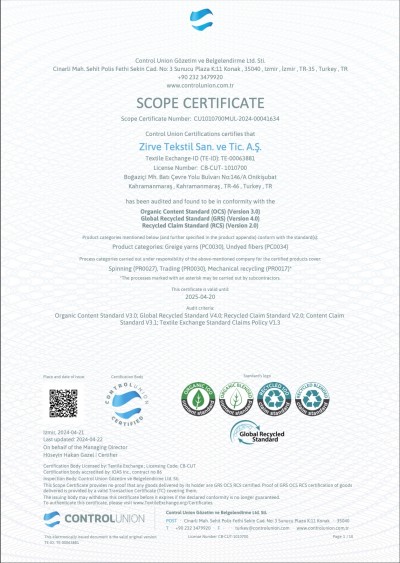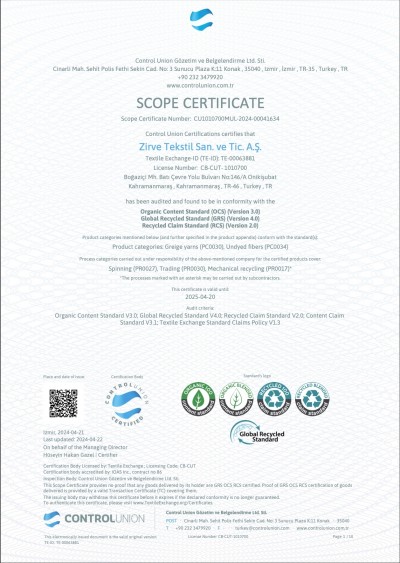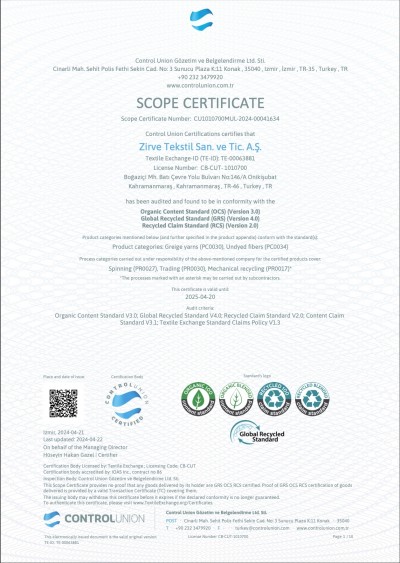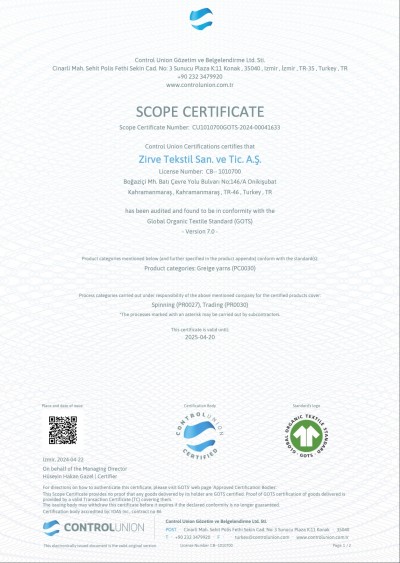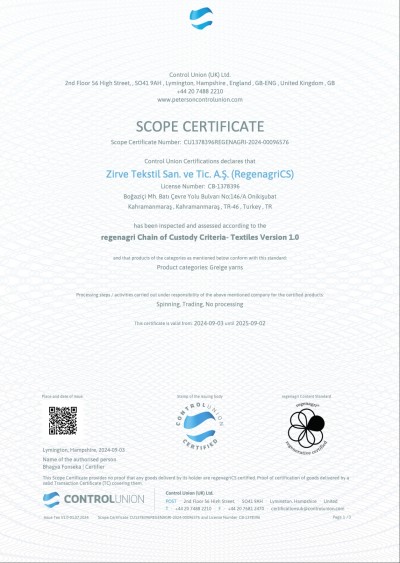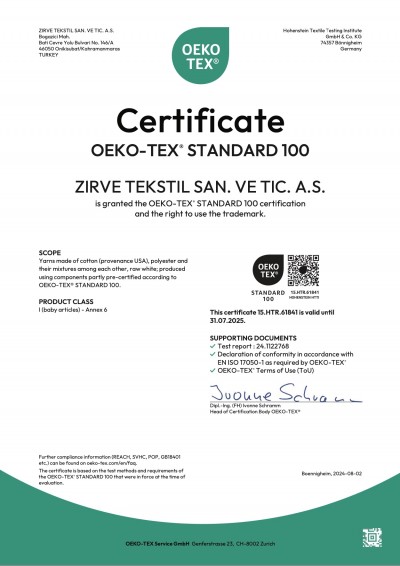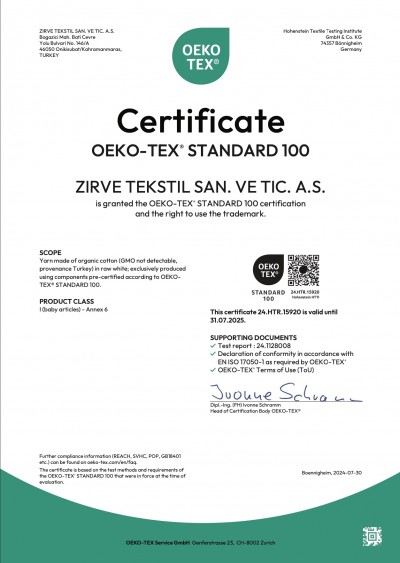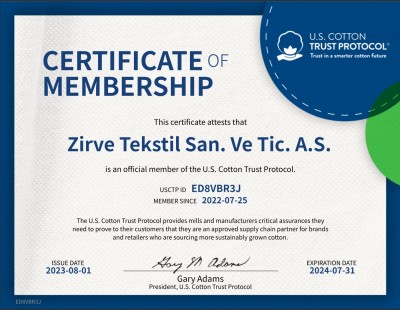CERTIFICATES
- HOME PAGE
- CERTIFICATES
OCS (Organic Content Standard) is a standard developed to ensure the traceability and accuracy of organic content. Managed by Textile Exchange, this standard ensures that organic materials can be tracked throughout the supply chain, from production to the final product. OCS guarantees the amount of organic content and the accuracy of organic product claims.
OCS is used to verify that a product contains between 5% and 100% organic material, and it confirms the accuracy of the organic content through a third-party certification system. Throughout the process, the OCS certification guarantees that the material is organic at each stage and verifies the amount of organic content at each point in the supply chain.
The OCS certification is particularly important for producers and consumers demanding organic content in textiles, apparel, home textiles, and personal care products. This standard not only ensures the integrity of organic content but also supports producers and brands in achieving sustainability and transparency.
The Global Recycled Standard (GRS) is an international certification standard developed to ensure the accuracy and traceability of recycled materials. Managed by Textile Exchange, GRS allows recycled material to be tracked at every stage of the supply chain and ensures that it is processed in compliance with social, environmental, and chemical production criteria.
The GRS certification requires a product to contain at least 50% recycled content, verified through third-party certification. Additionally, GRS sets strict criteria regarding workers' rights, environmental management, and the use of hazardous chemicals. This means that not only is the recycling process itself verified, but social and environmental responsibility is ensured throughout all stages of production.
GRS is particularly preferred by manufacturers and brands in the textile and fashion industries that seek sustainability and transparency. This standard helps brands and producers reduce their environmental impact, promote recycling, and offer sustainable products.
Recycled Claim Standard (RCS) is a certification standard developed to ensure the accuracy and traceability of recycled materials. Managed by Textile Exchange, RCS allows recycled material to be tracked and verified at every stage of the supply chain, ensuring that the recycled content is accurately used in the final product.
RCS requires products to contain at least 5% recycled content, which is verified through third-party certification. This standard is specifically designed to guarantee the accuracy of recycled content claims made to consumers.
RCS is preferred by brands and manufacturers in the fashion and textile industries that aim to support sustainability by using recycled content. By verifying the recycled content at every stage of the supply chain, RCS helps reduce the environmental impact of products and provides transparency to consumers.
GOTS (Global Organic Textile Standard) is an international certification standard that ensures compliance with environmental and social criteria throughout the entire production process of organic textile products. GOTS defines organic textile production from the harvesting of raw materials to labeling the final product, guaranteeing that organic content is produced sustainably and in a socially responsible manner.
GOTS applies to products containing at least 70% organic fibers and verifies the authenticity of the organic content through third-party certification. In addition to ensuring organic content, GOTS also sets strict criteria for chemical use, water management, workers' rights, and environmental impact. These criteria demonstrate that GOTS-certified products meet high standards in terms of sustainability.
GOTS is recognized worldwide as a reliable organic textile standard for textile manufacturers, brands, and consumers. It guides producers and brands in offering environmentally friendly and socially responsible products, contributing to the transparent and sustainable growth of the organic textile market.
Regenagri is an international certification and verification standard aimed at going beyond sustainable agriculture to improve soil health, enhance biodiversity, and restore ecosystems. It supports farmers and the agricultural supply chain in transitioning to regenerative methods that work in harmony with nature. These methods aim not only to improve environmental outcomes but also to create more sustainable food and fiber production systems.
regenagri certification ensures compliance with regenerative standards, focusing on improving soil health, enhancing biodiversity, carbon sequestration, reducing synthetic input use, and improving animal welfare. This certification supports stakeholders across the agricultural supply chain in minimizing environmental impact and transitioning to sustainable, nature-friendly production practices, contributing to more resilient agricultural systems.
OEKO-TEX Standard 100 is an international, independent testing and certification system that ensures textile products are free from harmful substances. This standard guarantees that chemicals used in the production of textiles are not harmful to human health, ensuring the safety of the products. OEKO-TEX Standard 100 covers not only the final product but also all components such as fabric, yarn, buttons, and zippers, providing comprehensive safety assurance.
For a textile product to be certified with OEKO-TEX Standard 100, all of its components must pass strict testing criteria. Tests focus on substances that may be harmful to health, such as formaldehyde, pesticides, chlorinated phenols, heavy metals, and azo dyes. Products are evaluated according to stringent standards that go beyond national and international regulations, and only those that meet all requirements are certified.
OEKO-TEX Standard 100 provides assurance to consumers and companies in the textile industry that products are safe and healthy. This certification is particularly popular for garments that come into direct contact with the skin, home textiles, and children's and baby products, as it guarantees the safety and controlled chemical content of the products
BCI (Better Cotton Initiative) is an international organization that aims to make cotton production more sustainable worldwide. BCI trains cotton farmers to reduce their environmental impact by using less water, fewer chemicals, and fertilizers, while also promoting respect for workers' rights. The goal is to improve the environmental, social, and economic sustainability of cotton production.
BCI teaches farmers sustainable farming practices and ensures their implementation. These trainings cover topics such as water management, soil health, biological pest control, and the safe use of chemicals. Additionally, BCI aims to improve working conditions for farmers and workers and enhance the welfare of farming communities.
BCI cotton provides a more sustainable alternative in global cotton production, working to ensure less environmental harm and better social conditions throughout the cotton production chain. BCI-certified cotton offers producers opportunities to reduce environmental impact, improve worker rights, and meet the growing market demand for sustainable cotton.
1003952-1 - Zirve Tekstil San ve Tic A.S
U.S. Cotton Trust Protocol is a certification program aimed at enhancing sustainability in American cotton production. This protocol provides a comprehensive sustainability framework for farmers and the textile supply chain, focusing on improving environmental, social, and economic sustainability. The U.S. Cotton Trust Protocol helps increase transparency and traceability in production processes, supporting cotton producers in reducing their environmental impact and producing in more sustainable ways.
The U.S. Cotton Trust Protocol focuses on six key areas of sustainability: water usage, soil loss, greenhouse gas emissions, soil carbon, energy efficiency, and productivity. Performance indicators in these areas provide guidance to farmers on sustainable farming practices, helping them continuously improve their environmental impact.
In addition, the protocol ensures transparency throughout the cotton supply chain, making every stage of production traceable. This traceability allows textile manufacturers and brands to meet the growing demand for sustainable cotton and offer safe and environmentally friendly products to consumers. The U.S. Cotton Trust Protocol supports both farmers and brands in reaching higher standards of sustainability in cotton production.

